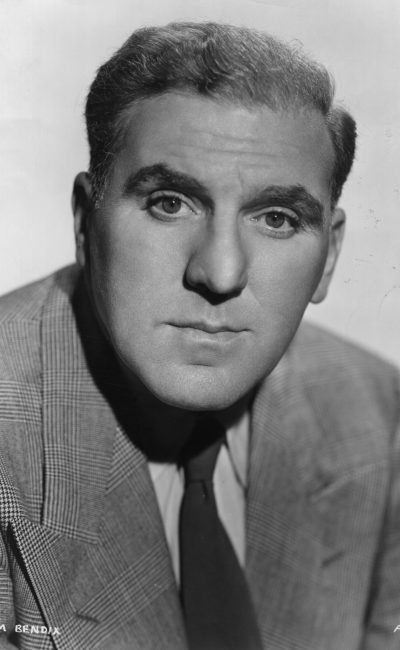William Bendix
ActorBiografía
William Bendix was not a son of Brooklyn, New York, although because of his stereotypical “Brooklyn accent” it has been widely supposed that he was. Bendix was actually born in the Borough of Manhattan (New York City proper), in a midtown flat hard by the tracks of the long-since defunct Third-Avenue Elevated Railway. (Manhattan sections of the “El,” as New Yorkers called it, were demolished circa 1956.) Jut-jawed, broken-nosed and burly, Bendix began his acting career after the ravages of the Great Depression had killed his erstwhile grocery business. Having performed in nightclubs even while grocer, and having portrayed taxicab drivers in a series of Broadway flops, he enjoyed his first notable performance on the Broadway stage in 1939, portraying the cop Krupp in William Saroyan’s “The Time of Your Life.” His Hollywood feature debut came about in one of his few starring roles, in Hal Roach’s Brooklyn Orchid (1942). But more often than not, in his movies Bendix received less than top billing, inasmuch as so many of his film assignments involved supporting roles. Despite (or perhaps on account of) his looks he was often called upon to supply comedic support, as in A Connecticut Yankee in King Arthur’s Court (1949), when, portraying Sir Sagramore of King Arthur’s Round Table in full suit of armor and pageboy wig, he waxeth eloquent, in his Brooklyn accent but in the most incongruent of Middle English dialects! On the other hand, that same craggy appearance had him in such roles as that of the thug Jeff in The Glass Key (1942), in which he repeatedly and gleefully uses his fists to beat star Alan Ladd’s face to a pulp and then sadistically challenges Ladd, once he is healed, to come back and receive further “treatment”! Although he will always be fondly remembered for his light-comedy portrayals (in *three* of the mass media!) of Chester A. Riley in The Life of Riley (1949) and The Life of Riley (1953), perhaps William Bendix’s finest and most memorable dramatic performance came in Lifeboat (1944), when he touchingly interprets the role of Gus, the shipwreck survivor whose gangrenous limb has to be removed, the absence of anesthesia notwithstanding.

